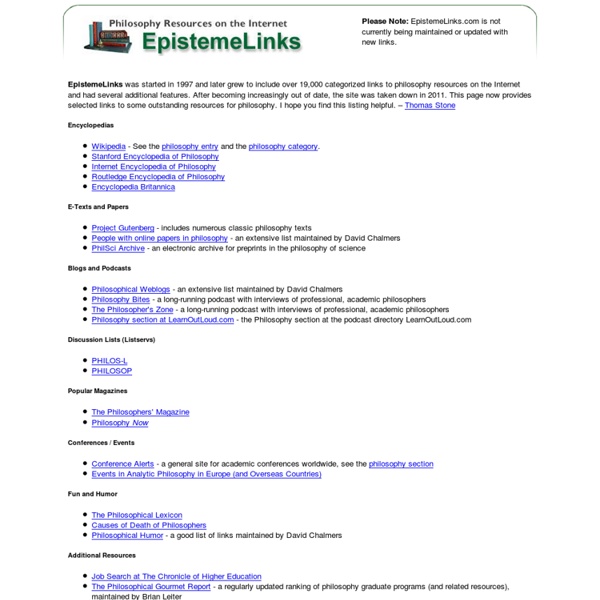



Philosophical Powers: Philosophy Action Figures Philosophical Powers has moved! Update your links to the 'new' URL: files.nyu.edu/iav202/public/powers/powers.html. I had a little extra time on my hands the summer after my first year as a graduate student in Indiana University's prestigious philosophy department, so I decided to take on a project that would blend two of my greatest interests--or rather, one of my petty distractions and my greatest interest, which are philosophy and toys, respectively. I wanted to do something that would bring a discipline that is often seen as difficult, esoteric, and even irrelevant, into new light--especially in the eyes of young people.
Major Converter Sites What Can I Do With a Major In... Students struggle with this question every day. In reality, some individuals will work in an occupation directly related to their major, while others will find employment simply because they are college-educated. Intro Gendlin, E.T. (1997). A process model. New York: The Focusing Institute. Recent articles by Gendlin not yet added to the Library Gendlin, E.T. (2013).
What is Philosophy? An Omnibus of Definitions from Prominent Philosophers by Maria Popova “Philosophy is 99 per cent about critical reflection on anything you care to be interested in.” Last week, we explored how some of history’s greatest minds, including Richard Feynman, Carl Sagan, Albert Einstein, Marie Curie, and Isaac Asimov, defined science. Kant famously considered philosophy the “queen of the sciences” — whether or not that is true, philosophy seems even more elusive than science to define. From Philosophy Bites, the book based on the wonderful podcast of the same name, comes an omnibus of definitions, bound by a most fascinating disclaimer — for, as Nigel Warburton keenly observes in the book’s introduction, “philosophy is an unusual subject in that its practitioners don’t agree what it’s about.”
Nine top tips for Media Studies students at Theory.org.uk Do take care with writing and presentation You may think this is boring, but very few students get it completely right. As media students, it's especially important. All the good quality things you see online, on TV, in print, or at the movies are presented perfectly – very carefully designed and laid out, well spoken or written, with no glaring errors.
Filosofía para Niños The US philosopher Mathew Lipman, created Philosophy for Children in 1969, and nowadays more than 50 countries from all continents has applied its program. The goal has nothing to do with trying to convert these children and teenagers into professional philosophers, but instead, its aim is to develop and preserve their critical, creative and caring thinking and attitude. The program is based on: College Profiles - Eugene Lang College Eugene Lang College 65 West 11th Street New York, New York 10011 Admission: Tel (212) 229-5665or Fax (212) 229-5355 ENROLLMENT Undergraduates: Full-time: 182 men/338 women Number who applied: 743 Number accepted: 426 Number enrolled: 130 Average SAT scores: V 638 M 560 Average ACT score: 27 Average GPA: 3.3 Freshman retention rate: 85% COSTS: Tuition: $29,530 Room and Board: $11,555 Fees, books, misc.: $3,250 approx.
Evolutionary Pragmatism A Discourse on a Modern Philosophy For the 21stCentury By Stuart A. The Largest-Ever Survey of Philosophers: What Do They Believe? Last year, David Bourget and David Chalmers conducted an exercise in the sociology of philosophy, the largest survey of philosophers ever (3000+ respondents): the PhilPapers Surveys. Now that new results have been released, let’s look back at the findings. First, it’s worth noting, as the editors do, that (1) the survey focuses mostly on Anglophone analytic philosophers, and (2) answer choices were often too brief for respondents to know how to answer, and that (3) though the response rate of 47% was pretty good, there is inevitably some selection bias, probably toward younger analytic philosophers.
30 Websites that Pay You to Contribute an Article, Instantly If you’ve ever considered writing for money, you are in the right place. After careful effort and painstaking research, I prepared and compiled this list of websites that offer writers an opportunity to make money writing articles. All the sites on this list are genuine. Below is a testimonial from a reader about the results she got from writing for one of the sites on one of my lists. Ereignis - Martin Heidegger in English @ beyng.com Punktmannigfaltigkeit Welcome to my Heidegger site. It contains information on the German philosopher Martin Heidegger (1889-1976) and links to related web pages in English.
Philosophy Mission: Develop thrivable agents and a flourishing network to co-create a more thrivable world. We work with a 5 point model, considering the individual, their environment (at many scales), the social interactions involved, the feedback and metrics to enable adjustment of the course, and the conditions for creativity. Thrivable Elements Creative
Guidelines on Writing a Philosophy Paper Philosophical writing is different from the writing you'll be asked to do in other courses. Most of the strategies described below will also serve you well when writing for other courses, but don't automatically assume that they all will. Nor should you assume that every writing guideline you've been given by other teachers is important when you're writing a philosophy paper. Some of those guidelines are routinely violated in good philosophical prose (e.g., see the guidelines on grammar, below). Contents What Does One Do in a Philosophy Paper?